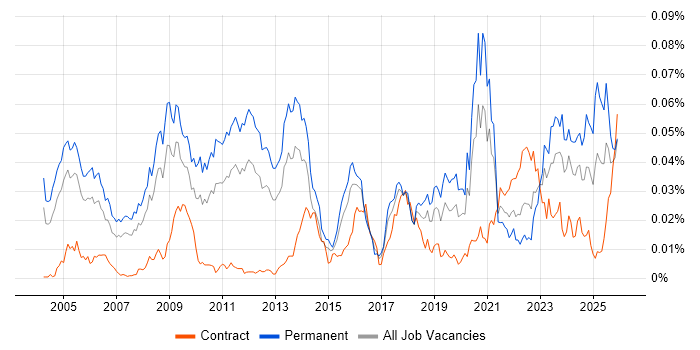Quantitative Trading
UK > England
The table below provides summary statistics and contractor rates for jobs advertised in England requiring Quantitative Trading skills. It covers contract job vacancies from the 6 months leading up to 17 December 2025, with comparisons to the same periods in the previous two years.
| 6 months to 17 Dec 2025 |
Same period 2024 | Same period 2023 | |
|---|---|---|---|
| Rank | 539 | 506 | 549 |
| Rank change year-on-year | -33 | +43 | +154 |
| Contract jobs citing Quantitative Trading | 10 | 5 | 8 |
| As % of all contract jobs in England | 0.032% | 0.017% | 0.022% |
| As % of the Processes & Methodologies category | 0.036% | 0.019% | 0.024% |
| Number of daily rates quoted | 3 | 2 | 8 |
| 10th Percentile | £732 | £845 | £400 |
| 25th Percentile | £767 | £856 | £681 |
| Median daily rate (50th Percentile) | £850 | £900 | £850 |
| Median % change year-on-year | -5.56% | +5.88% | +9.68% |
| 75th Percentile | £888 | £931 | £881 |
| 90th Percentile | £895 | £935 | £908 |
| UK median daily rate | £850 | £900 | £850 |
| % change year-on-year | -5.56% | +5.88% | +9.68% |
All Process and Methodology Skills
England
Quantitative Trading falls under the Processes and Methodologies category. For comparison with the information above, the following table provides summary statistics for all contract job vacancies requiring process or methodology skills in England.
| Contract vacancies with a requirement for process or methodology skills | 27,925 | 25,808 | 32,921 |
| As % of all contract IT jobs advertised in England | 88.90% | 88.45% | 88.67% |
| Number of daily rates quoted | 17,780 | 15,959 | 22,396 |
| 10th Percentile | £300 | £310 | £313 |
| 25th Percentile | £406 | £418 | £425 |
| Median daily rate (50th Percentile) | £505 | £525 | £545 |
| Median % change year-on-year | -3.81% | -3.67% | -0.91% |
| 75th Percentile | £625 | £650 | £650 |
| 90th Percentile | £725 | £750 | £750 |
| UK median daily rate | £500 | £525 | £530 |
| % change year-on-year | -4.76% | -0.94% | -3.64% |
| Number of hourly rates quoted | 1,812 | 863 | 1,395 |
| 10th Percentile | £15.00 | £15.62 | £15.00 |
| 25th Percentile | £17.87 | £20.30 | £19.06 |
| Median hourly rate | £25.15 | £35.00 | £44.50 |
| Median % change year-on-year | -28.14% | -21.35% | +19.30% |
| 75th Percentile | £53.75 | £65.00 | £65.00 |
| 90th Percentile | £68.75 | £74.97 | £77.50 |
| UK median hourly rate | £25.15 | £32.50 | £43.84 |
| % change year-on-year | -22.62% | -25.86% | +25.25% |
Quantitative Trading
Job Vacancy Trend in England
Historical trend showing the proportion of contract IT job postings citing Quantitative Trading relative to all contract IT jobs advertised in England.

Quantitative Trading
Daily Rate Trend in England
Contractor daily rate distribution trend for jobs in England citing Quantitative Trading.

Quantitative Trading
Daily Rate Histogram in England
Daily rate distribution for jobs citing Quantitative Trading in England over the 6 months to 17 December 2025.
Quantitative Trading
Contract Job Locations in England
The table below looks at the demand and provides a guide to the median contractor rates quoted in IT jobs citing Quantitative Trading within the England region over the 6 months to 17 December 2025. The 'Rank Change' column provides an indication of the change in demand within each location based on the same 6 month period last year.
| Location | Rank Change on Same Period Last Year |
Matching Contract IT Job Ads |
Median Daily Rate Past 6 Months |
Median Daily Rate % Change on Same Period Last Year |
Live Jobs |
|---|---|---|---|---|---|
| London | -2 | 10 | £850 | -5.56% | 4 |
| Quantitative Trading UK |
|||||
Quantitative Trading
Co-Occurring Skills & Capabilities in England by Category
The following tables expand on the one above by listing co-occurrences grouped by category. They cover the same employment type, locality and period, with up to 20 co-occurrences shown in each category:
